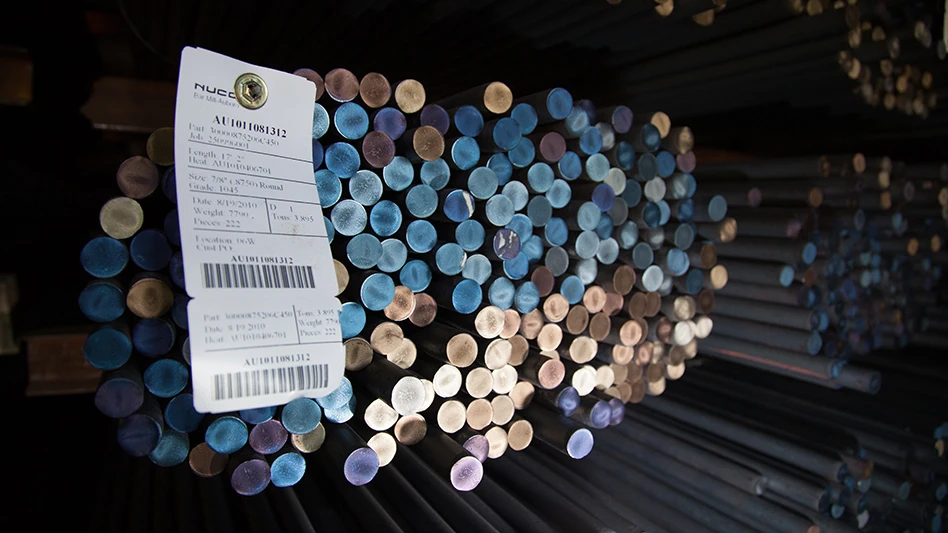
Photo courtesy of Nucor Corp.
The price of steel rebar on the spot market in China has fallen by more than 11 percent in 30 days, with metals industry news and pricing services reporting ripple effects in adjacent markets.
Rebar prices on the Shanghai Futures Exchange (SHFE) and other exchanges in China stood at more than 3,900 renminbi (RMB) ($543) per metric ton in mid-February. At the close of trading last Friday, the SHFE rebar price was less than 3,460 RMB ($481), for a drop of about 11.5 percent in its value.
Analysts have long questioned for how long China could continue to produce and consume steel at the same pace it did in previous decades. The nation’s economy is contending with an overbuilt apartment tower sector and a highway and rail network infrastructure that is much closer to reaching its end stages of development than it was in the boom years.
The impact of lower rebar pricing already is demonstrating impacts in China and in adjacent regional markets, according to reporting from Kallanish Commodities.
That London-based firm says some long products steel mills in China have begun to scale back production in response to likely unprofitable conditions.
Steel prices in Vietnam and steel billet prices throughout the Association of Southeast Asian Nations (ASEAN) region also are falling, Kallanish says, and regional iron ore prices, likewise, are on a downward trajectory.
Even as far away as Turkey, an important buyer of exported American scrap, rebar export mills are facing a global market now expecting lower prices, according to the metals information service.
Last week, S&P Global Commodity Insights indicated finished steel inventories were rising in China and that some steel market participants were disappointed that no major metals-intensive economic stimulus measures were announced after a high-level Chinese Communist Party meeting in early March.
Those factors could be playing a part in the current rebar market in China, where suppressed steel prices are being experienced at the same time steel producers in the United States have been announcing higher prices for several grades of finished steel.
Both the Trump and Biden administrations have backed the concept of either decoupling or “derisking” portions of the U.S. manufacturing sector and supply chains to be less dependent on China.
By the numbers, China currently does not carry hefty influence within the steel market in the U.S. This January, China ranked 11th among nations shipping steel into the U.S., according to Census Bureau figures collected by the Washington-based American Iron and Steel Institute (AISI).
The 38,000 tons of steel that were shipped from China to the U.S. were less than 10 percent of the 396,000 tons that came from Mexico and are just 5.4 percent of the volume that arrived from Canada.
Other nations that shipped more steel than China into the U.S. this January were Brazil, South Korea, Japan, Germany, Vietnam, Taiwan, Italy and the Netherlands.
The January data indicating a more decoupled sector jibes with statistics for the U.S. steel import market in 2023, according to the AISI. Last year, the U.S. imported 14.1 percent less finished steel than it did in 2022 and 8.7 percent less steel in finished and semifinished forms combined.
Last year, China’s shipments represented a sliver of an overall smaller pie of imports, and its steel shipments to the U.S. fell by 8.2 percent (53,000 tons) in 2023 compared with 2022.
Steelmakers in the U.S., including scrap-fed electric arc furnace producers that help determine the price of ferrous scrap, express greater concern about Chinese steel entering the U.S. market via a “triangular” trading pattern involving other nations, including Mexico.
Late last year, Katherine Tai, who leads the federal office of the U.S. Trade Representative (USTR), met with a counterpart in Mexico in part to discuss that nation’s ability to monitor and prevent “triangular” trading involving tariffed or sanctioned steel and aluminum being trans-shipped through Mexico.
Latest from Recycling Today
- BMW Group, Encory launch 'direct recycling’ of batteries
- Loom Carbon, RTI International partner to scale textile recycling technology
- Goodwill Industries of West Michigan, American Glass Mosaics partner to divert glass from landfill
- CARI forms federal advocacy partnership
- Monthly packaging papers shipments down in November
- STEEL Act aims to enhance trade enforcement to prevent dumping of steel in the US
- San Francisco schools introduce compostable lunch trays
- Aduro graduates from Shell GameChanger program





